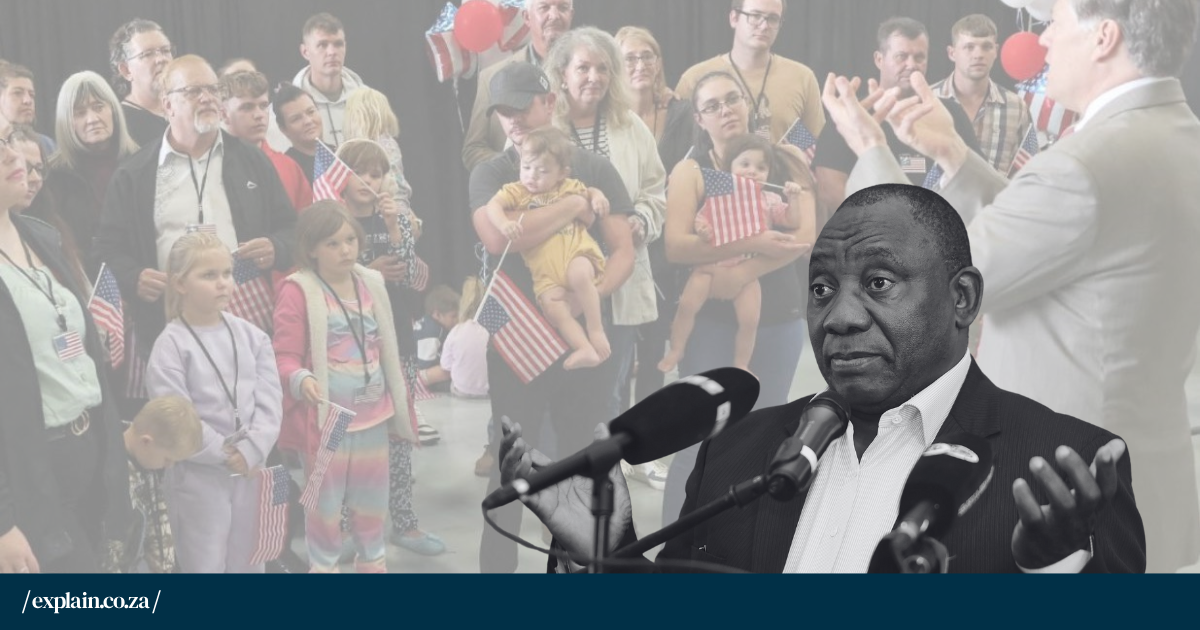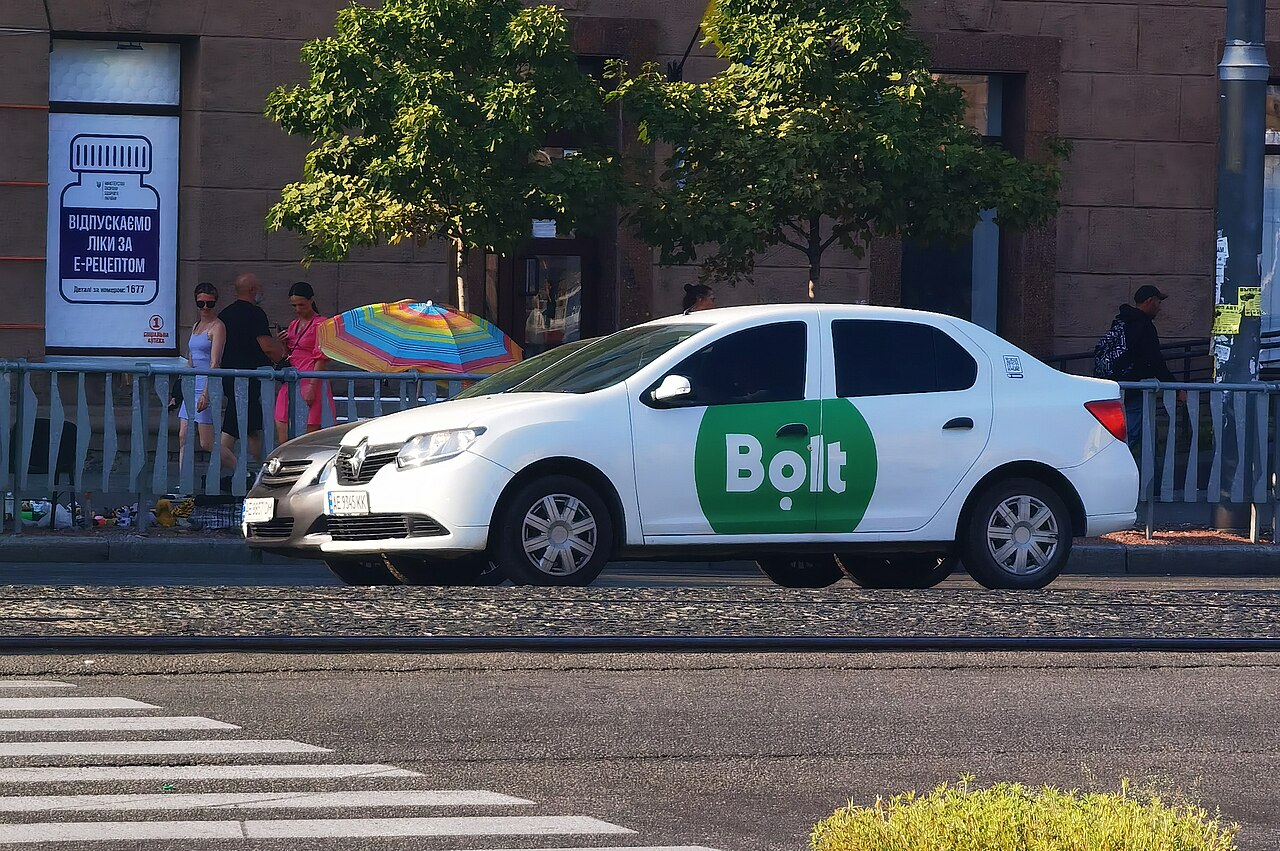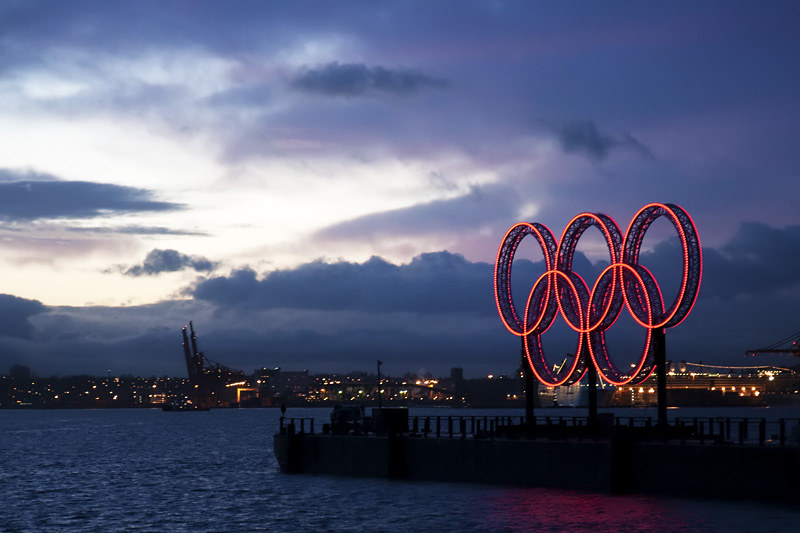Hi there 🙋🏾♀️
Have you missed us? We’ve sure missed you. But fret not, we’re back, and we’re better than ever.
We’re spicing things up! We’ve changed our format to bring you the news that matters to you in more bite-sized packaging, with shorter briefs up front and then a dive into meatier stories. So, tell your friends to check us out and who knows? We might get them wrapped around our fingers pretty soon. 😉
This week, we chat to you about white ‘refugees’, private jets and a touching farewell at one of Mzansi’s biggest soccer clubs. We also unpack what to expect as our finance minister takes a gander at the budget for the third time, and why some court cases like Joshlin Smith concluded quickly while others drag on for years.
So, let’s dive into these stories and more in this week’s wrap, brought to you by Verashni Pillay and the explain.co.za team. 😄
_____________________________
Format:
🇳🇪🇼🇸
▁ ▂ ▄ ▅ ▆ ▇ █ BRIEFS:
🌶️ Spicy Cyril is our favourite
A day after white Afrikaner “refugees” landed in the US Monday, Ramaphosa posted videos on X showing happy interactions with largely white Afrikaans farming communities. Ramaphosa had caught flak earlier that day for calling those who left “cowards”, and, previously, referencing colonisers historically allowed to stay in SA. The videos were taken during his visit to Nampo 2025, an agricultural gathering running this week in Bothaville, Free State. Experts at the event said Agoa, which offers Sub-Saharan African countries favourable export terms to the US, was effectively dead, given Trump’s revenge vendetta against SA and largely discredited global tariff regime. They encouraged SA farmers to find new markets, including Asia and the Middle East. Ramaphosa will meet with US President Donald Trump in a working visit to the US next week and says they’ve spoken telephonically. We’re crossing fingers, but not holding our breath. 👀
⚽ Mara why, Jose?
With SA accused of being unwelcoming to white people, it was wonderful to watch our people roll out the red carpet for Spanish-born Orlando Pirates coach José Riveiro. His final match on Tuesday – a fitting 3–0 win over Golden Arrows – ended in a carnival-like farewell: a packed Orlando Stadium, fans singing “Gracias, José”, and one supporter decking the Spaniard out in Zulu attire. Quite the contrast to 2022, when he was mocked as a “plumber” for his low-profile coaching in Finland. But Riveiro won trophies, took Pirates to a CAF Champions League semi-final, and helped launch a new crop of Bafana stars. Even a recent Nedbank Cup loss to the Chiefs didn’t dim the send-off. One banner said it best: “Mara, why Jose?” He chose not to renew his three-year contract, believing that prolonged tenures hinder player development and gave early notice for complete transparency. It was a study in class.
✈️ Trump jets off: Middle East tour
Donald Trump’s Middle East tour this week began in scandal after he boasted about Qatar gifting him a $400 million Boeing to replace the ageing Air Force One. Trump viewed the opulent “flying palace” in Florida in February. Ethics lawyers from the Clinton, Bush, and Obama eras slammed the gift, noting the US Constitution bars presidents from accepting foreign gifts without Congress’s nod. They’ve also said Trump’s personal $5.5 billion Qatari golf resort deal and his crypto ventures, tied to Emirati funds, is a potential conflict of interest. This was Trump’s first major international tour during his second term, and he secured massive deals for the US – $600 billion from Saudi Arabia and $1.2 trillion from Qatar, eclipsing his 2017 pledges. He lifted Syria sanctions and addressed Iran’s nuclear programme. But excluding Israel from his itinerary has strained ties. Oh, and he teased a decision on renaming the Persian Gulf to “Arabian Gulf”. Of course.
🌿 Cape Town’s Kirstenbosch named among world’s best
Kirstenbosch National Botanical Garden in Cape Town was ranked one of the top 25 gardens globally by The New York Times last week, as chosen by six horticultural experts. Cape Town’s favourite place for picnics and concerts made the list alongside gorgeous spots in Italy and Japan – and New York’s famous High Line. Kirstenbosch is recognised for its size, biodiversity and exclusive focus on indigenous South African flora. Founded in 1913, it was the first botanical garden worldwide to focus solely on native plants – and remains home to over 7,000 species, including rare fynbos, proteas, ericas and ancient cycads believed to predate dinosaurs. Set against Table Mountain’s eastern slopes, the 1,305-acre reserve also attracts sunbirds, owls and wildcats. Harvard architecture professor Toshiko Mori praised Kirstenbosch’s century-long conservation efforts, while British garden writer Tim Richardson called it “possibly the most spectacular botanical garden in the world”.
🎬 Dress code drama outshines films at Cannes
The world’s most prestigious film festival, Cannes, kicked off in France on Tuesday. But thanks to a last-minute dress code issued just a day before, no one is really talking about the films. Organisers have banned nudity like the “naked’ dress trend, citing “decency”. Think Bianca Censori’s completely see-through slip, at February’s Grammys. Stylist Karla Welch slammed the decision, saying, “We don’t need governing bodies governing our bodies.” Then there’s the ban on lengthy trains to streamline red carpet flow. The first casualty? Festival jury member, Halle Berry. “I had an amazing dress by [Gaurav] Gupta to wear tonight, and I cannot wear it because the train’s too big,” she said. Others weren’t as compliant. Heidi Klum’s trailing Elie Saab gown at the opening already broke the rules. As for the films? We couldn’t tell you. Ironically, Cannes’s attempt to redirect our attention has done the opposite.
▁ ▂ ▄ ▅ ▆ ▇ █ BIG STORIES:
South Africa’s budget 3.0: Third time’s the charm?
Next Wednesday, 21 May, Finance Minister Enoch Godongwana is set to table South Africa’s budget for the third time this year, after months of delays and political wrangling.
According to economists at Bank of America (BofA), the real significance of Budget 3.0 lies in its political implications. “This budget is more important for signalling the GNU [Government of National Unity] temperature than for any forecasts it may contain,” the group noted.
They add Treasury is likely to take a cautious route, projecting GDP growth at 1.5%–1.6% — slightly higher than market forecasts of 1.0%–1.5%. That would help present a smaller, more palatable budget gap of R20 billion to R30 billion, which GNU partners might find easier to support.
Previously, a worsening economic outlook — weighed down by global challenges and sluggish local reforms — left the country facing a possible R73 billion budget shortfall.
There is another bright spot: global market instability has boosted gold prices, bringing in more revenue from mining. SARS is also stepping up tax enforcement, giving Treasury some breathing room.
A recap: The main culprit behind the delays was VAT. The original budget, announced on 12 March, proposed a 2% VAT hike, sparking public outrage, chaos within the GNU, and court action. Treasury backed down. “When people speak, we must also listen,” Godongwana said in a statement last month, confirming VAT would remain at 15%. He added that the change was shaped by political concerns and public feedback.
After the GNU drama that followed the previous two budget attempts, this budget is ultimately a political test. If it doesn’t get support from major GNU players like the Democratic Alliance, expect more delays and more uncertainty for South Africa’s economy. But we’re betting that the major political players have finally worked out their grievances. Third time lucky?
Fast track for Afrikaners, hard pass for real refugees
While most of us were bracing for Monday meetings, 49 white South Africans were touching down at Dulles Airport in the US, visas in hand and dreams of a new life. Fast-tracked under “Mission South Africa” — a programme cooked up by the Trump administration — these Afrikaners were granted entry on the basis of “race-based persecution” back home. The justification? SA’s land reform policies and false accusations of racially-targeted violent crime.
White South Africans still own 78% of the country’s private farmland and possess around 20 times the wealth of their black counterparts. If this is what persecution looks like, we’re all missing something. 🧐
Meanwhile, on his first day in office, on 20 January, Trump signed an Executive Order indefinitely halting entry through the US Refugee Admissions Program for actual refugees in desperate need of asylum.
Take Afghanistan. After the Taliban regained power in 2021, women were banned from school and work, leaving 14,600 Afghans and former US allies in legal limbo. Or the DRC, where 7.8 million people have been displaced amid civil war, and 28 million face serious food insecurity.
In Sudan, a deadly mix of genocide and war has displaced 8 million people — but resettlement programmes have ground to a halt. Cameroon’s Anglophone conflict has triggered mass killings and displacement, yet 8,000 Cameroonian refugees lost their Temporary Protected Status last month.
Court battles over these bans in the US drag on, but not much moves.
Professor Jacob S. Dlamini, a historian at Princeton University who grew up under apartheid, told Vox, “It is bitterly ironic that [Trump] has stopped the processing of refugee applications for everyone except this group of privileged white South Africans.” He emphasised that Afrikaners continue to hold significant economic and social privileges, and do not face any persecution that would justify refugee status.
Meanwhile, 49 white Afrikaners, many of whom looked VERY well-fed and pushed along a mountain of suitcases, were fast-tracked in just three months. The development has dominated and divided international news and social media. And with the Trump administration promising to bring in more Afrikaner refugees, this issue is going to keep coming up.
Read the full article here
Will Tiger Brands finally pay victims?
Tiger Brands, one of South Africa’s biggest food companies, has finally agreed to begin settling with victims of the country’s worst-ever listeriosis outbreak – seven years after it happened. The outbreak, traced to the company’s Enterprise factory in Polokwane in 2017, killed over 200 people and infected more than 1,000, many of them babies. It’s the world’s deadliest listeriosis outbreak to date.
Listeriosis is a serious bacterial infection that can cause meningitis. In SA, it hit pregnant women and newborns especially hard: Women who were infected by Tiger Brands’ products miscarried and lost their babies, one after just a day. Over 400 newborn cases were linked to infected food. One case, seven-year-old Theto Ngobeni, now lives with severe neurological damage after her mother ate contaminated polony while pregnant, and has been pulled out of school.
Despite overwhelming evidence – including a 2024 genetic study proving a direct link between Tiger Brands’ plant and the specific ST6 strain infecting over 300 of the victims – the company has fought tooth and nail to avoid payouts. It denied liability, delayed legal processes, and refused to compensate victims. A class action lawsuit launched in 2018 by RSI and LHL Attorneys has been fighting since.
That changed this week. On Monday, just as court proceedings loomed, Tiger Brands suddenly told shareholders they’d made a limited settlement offer: they’d compensate only the 300 people whose cases were genetically linked to the ST6 strain. But those victims were a random selection of cases chosen for further testing. This settlement offer excludes hundreds of others who ate the same products but weren’t tested. The class action lawyers argue the distinction is arbitrary.
The settlement includes full damages – but there’s no figure yet, and no clarity on how claims will be handled.
The court must still approve the structure to ensure fairness, and the class action continues in parallel.
This is the first effective admission of liability from Tiger Brands. But with most victims still excluded, justice for all remains elusive.
Disclaimer: Please note that explain.co.za’s sister agency company, Explain the Agency, has done PR work for the class action attorneys involved in this matter.
Read the full article here
Joshlin’s trial moved fast. So why are most SA cases painfully slow?
When six-year-old Joshlin Smith disappeared from her home in Saldanha Bay in February 2024, South Africa watched in horror. Within days, her mother, her mother’s boyfriend and a friend were arrested. In just over a year, the case was tried, and a verdict was handed down, an unusually fast outcome for a country where justice usually takes its sweet time.
The murder trial of footballer Senzo Meyiwa is still going on a decade later. The state capture prosecutions are crawling. And televangelist Timothy Omotoso was recently acquitted after spending almost eight years behind bars awaiting trial.
So what made Joshlin’s case different?
Did the high public sentiment on missing children and the many eyes on this case prompt the National Prosecuting Authority to move this case to the front of the line?
Jeanne Bodenstein, head of the Rape Survivors Justice Campaign, theorises so: “There is a big realisation within the prosecuting authority and the justice system that they need to get this right. So they will make sure everything is very quick, that we have all our ducks in a row.”
But this kind of swift justice is the exception. Most cases take years. And the poorer you are, the longer it takes. South Africa’s courts are underfunded, overburdened, and understaffed, with just 250 judges for the whole country. Some cases are only getting court dates in 2031.
Legal Aid, relied on by many, is being squeezed by R718 million in budget cuts. And legal proceedings are just too expensive for most. Even with organisations like ProBono.Org, the costs can be crippling.
The result? Justice on paper, delays in reality. Fixing this means more judges, better case management, and real accountability. Until then, most South Africans, with less publicity, won’t see the kind of swift justice that Joshlin’s case delivered. And that’s a national tragedy.
Read the full article here
————–
That’s it from us at The Wrap, an award-winning product of explain.co.za – simple news summaries for busy people. 💁🏾♀
The Wrap is sponsored by explain’s agency division. We specialise in content marketing for purpose-driven organisations, often with a pan-African reach. Email info@explain.co.za for a quote.
🇸🇺🇧🇸🇨🇷🇮🇧🇪
Remember to share the love. 💫
Tell your friends to sign up:
📩 Email: https://explain.co.za/subscribe
📲 Our new WhatsApp channel: https://whatsapp.com/channel/0029Vac06yM8kyyLmOulb80J
_Till next time, goodbye from the team_ ✌🏽




